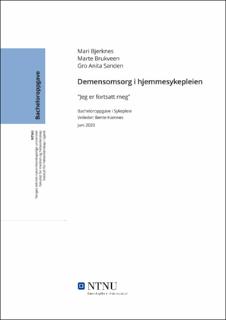| dc.contributor.advisor | Hamnes, Bente | |
| dc.contributor.author | Bjerknes, Mari | |
| dc.contributor.author | Brukveen, Marte | |
| dc.contributor.author | Sanden, Gro Anita | |
| dc.date.accessioned | 2020-07-15T16:01:10Z | |
| dc.date.issued | 2020 | |
| dc.identifier | no.ntnu:inspera:56389038:58700825 | |
| dc.identifier.uri | https://hdl.handle.net/11250/2669200 | |
| dc.description.abstract | Innledning: Mange eldre i Norge lever med demens og økt levealder resulterer i flere. Det er grunn til å tro at kompetanse og holdningsendring vil fremme forståelsen for demens og samtidig styrke et kollegialt samhold blant sykepleiere i hjemmesykepleien.
Hensikt: Hensikten med oppgaven er å finne måter en best kan møte pasienter med demens på gjennom kompetanseheving, holdningsendring og økt kunnskap.
Metode: Det er søkt i Medline(ovid) og SweMed+ med søkeord: Attitude, Quality of health care, Care mapping, educational status, dementia, person centered care og patient-centered care. Det ble brukt fem artikler til oppgaven.
Resultat: Gjennom personsentrert omsorg er det muligheter for å samhandle med pasienter som har demens på en måte som gir bedre kvalitet på pleien, mestringsfølelse og mindre stresset arbeidshverdag. Bedre pleiekultur vil skape en holdningsendring til utfordrende arbeid. Kompetanse man bærer med seg har en sammenheng med holdningen du har i møte med pasienter og kollegaer. Økt kunnskap gir økt kvalitet på pleien.
Konklusjon: Ved kompetanseheving vil pasienter med demens få et behandlingstilbud med fokus på personsentrert omsorg. Når sykepleier innehar rett kunnskap, nok kompetanse og gode holdninger, vil møtet med pasienter med demens gi trygghet, kvalitet og stabilitet. | |
| dc.description.abstract | Introduction: Many elderly in Norway live with dementia and increased lifespan results in more cases like this. There is reason to believe competence and attitude change will improve the understanding of dementia and at the same time strengthen professional unity among nurses in home care.
Aim: The purpose of this thesis is to find the best ways to interact with patients with dementia through enhanced competence, attitude change and increased knowledge.
Method: Searches in Medline (Ovid) and SweMed+ with keywords: Attitude, Quality of health care, Care mapping, educational status, dementia, person centered care and patient-centerd care. Five articles were used for the thesis.
Results: Person-centered care gives opportunities for interaction with patients with dementia in a way that improves the quality of nursing, sense of achievement and a less stressful workday. Improved nursing culture will create an attitude change towards challenging work. The competence one has is connected to their attitude towards patients, coworkers and their type of work. Increased knowledge improves the quality of nursing.
Conclusion: With enhanced competence, patients with dementia will get treatment with focus on person-centered care. When the nurse has the right knowledge, enough competence and good attitudes, the interaction with these patients will give a sense of safety, quality and stability. | |
| dc.language | | |
| dc.publisher | NTNU | |
| dc.title | Demensomsorg i hjemmesykepleien | |
| dc.type | Bachelor thesis | |
